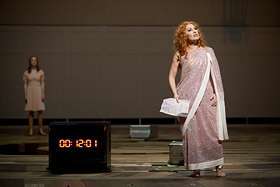|
Back
The Trials of Time Amsterdam
Het Muziektheater
05/18/2009 - & May 21, 25*, 28, 31, June 3, 7, 9, 12
Leos Janácek: The Makropoulos Case
Cheryl Barker (Emilia Marty), Raymond Very (Albert Gregor), Guy de Mey (Vítek), Marisca Mulder (Kristina), Dale Duesing (Jaroslav Prus), Andrew Tortise (Janek), François Le Roux (Dr. Kolenatý), Tom Haenen (A Stage Technician), Annett Andriessen (A Cleaning Lady), Graham Clark (Count Hauk-Sendorf), Bernadette ter Heyne (A Maid)
Rotterdam Philharmonic Orchestra, Choir of the Netherlands Opera, Yannick Nézet-Séguin (conductor)
Ivo van Hove (director), Jan Versweyveld (set and lighting designer), A.F. Vandervorst (costume designer)

M. Muller, C. Baker (© Hans van den Bogaard)
The passing of time is an intrinsic element in The Makropoulos Case, and the Netherlands Opera’s production emphasizes that aspect in every possible way. Jan Versweyveld’s set, a raked staged of concentric wooden circles that rotate at different rates, represents different perspectives of time, from Emilia Marty’s 337-year old vantage-point to Janek’s youthful take. To further underscore this theme, a digital clock is set on one of the rotating circles, counting down the entire playing time of the opera, the three acts of which are given without intermission. A spiral staircase emerges between rotating segments of the stage, where characters make the majority of their entrances and exits. The entire arrangement mirrors the feeling so common in Janácek’s music of motives moving in different tempos and meters, yet ingeniously combining to produce a cohesive musical unit.
If the theme of time dominates the visual aspect of this production, there is little doubt that the role of Emilia Marty dominates the vocal aspect. Janácek has created a tremendous tour de force in this role, and the Australian soprano Cheryl Barker has the perfect voice for it. Powerful, flexible and spot-on in pitch and rhythm, she complements technical mastery with superb acting skills, portraying in turn a powerful, desperate, seductive, contrite woman always on the verge of complete breakdown until her final catharsis and resignation to submit to the same order of time that the rest of the world deals with. The changes in color and vibrato in her voice are countless and drawn upon with ease, from deep, thick and husky in her seduction of Prus to cool, venomous, and laser-like in her indifference to Janek’s suicide. Her voice projects extremely well over even the densest of Janácek’s orchestration, never becoming shrill or thin in the sometimes extravagantly high tessitura requested by the composer.
Barker is expertly matched by Raymond Very’s Gregor. This is one of those high, bright tenor roles that is unique to Janáèek’s sound world and again requires a voice that can reach into and bloom in the very highest register without strain. Very has just this type of voice and his acting portrays a rather tortured, confused mind with great skill. Among the seductive and manipulative interactions between Emilia and others on-stage, this was the most convincing, Very singing strongly and confidently, yet his facial expressions betraying the knowledge that something is amiss.
The remainder of the cast is vocally very strong. The superb French baritone François Le Roux brings his crisp and beautiful timbre to the role of Kolenatý, and Graham Clark’s Hauk-Sendorf steals every scene with just the right amount of noir comedy in a similar vein as the Beggar Woman in Sweeney Todd (“Hey there, don’t I know you mister?”). As Janek, Andrew Tortise sings his few lines with an enjoyable tone, but seems a bit awkward and unsure on stage, not quite fitting in with the rest of the cast. While this might be appropriate for Janek’s naivety, Tortise seems to be doing it accidentally instead of with purpose.
The Rotterdam Philharmonic Orchestra plays the difficult score very well, with excellent contributions from the trumpets and, notably, principal clarinetist Julien Hervé. Yannick Nézet-Séguin makes the elaborate overlapping of motives fit together like a Swiss watch, and the entire production is skillfully paced, proceeding like clockwork.
Marcus K. Maroney
|